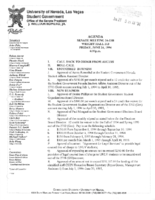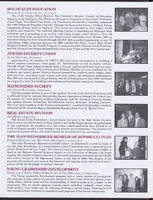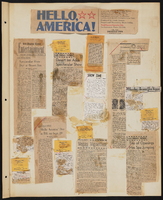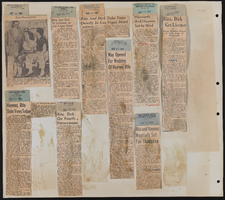Search the Special Collections and Archives Portal
Search Results

Transcript of interview with Norma Morrow Zuckerman by Barbara Tabach, April 18, 2016 & March 13, 2017
Date
Archival Collection
Description
Norma Morrow Zuckerman is the driving force behind the Jewish Repertory Theatre of Nevada [JRTN], an organization she co-founded with Charlene Sher in 2010. The endeavor coincided with Norma’s pursuit of an MFA at UNLV a couple of years prior. With the commitment to her studies and to bring professional Jewish theatrical performances to Las Vegas, her energetic personality intensified. In 2007, she performed in The Diary of Anne Frank and noted the audience was supporting Jewish Family Services Agency. Norma could sense the community’s eagerness for professional theatre and she was just the one to deliver it. Over the following years, JRTN produced an array of Jewish-themed and acted plays. Since then she tries to bring The Diary of Anne Frank to the stage annually and finds partners to bring 1400 eighth graders to the performance. By 2012, her commute between Los Angeles, where she is a garment designer/manufacturer with her husband Eugene, and Las Vegas had become routine and her passion for professional theatre in Las Vegas increased. This was the year that The Smith Center for Performing Arts opened. The first theatrical production was Golda’s Balcony, a one-woman drama starring Tovah Feldshuh. It was the spectacular co-promotion by Norma’s JRTN and the Smith Center. Norma was smitten with the theatre from a young age and studied with some of the best acting coaches—Milton Kastelas, Stella Adler, Wynn Handman. In this oral history she recalls the people who have helped her, the performances that have charmed audiences and the value of live theatre.
Text

Mario Sandoval interview, December 6, 2018: transcript
Date
Archival Collection
Description
Interviewed by Claytee White. Mario and his six siblings were reared by a single mother who taught him all of the family recipes. Moving to Las Vegas at four years of age Mario remembers moving into a black neighborhood where the family was not welcomed. All windows in their home were broken into the first night. The family moved the next day. Though the new house was still in an African American neighborhood, they were protected by Vera, their black babysitter. Mario developed the intense work ethic of his mother, and after working in several strip casinos, found his home at the Horseshoe, today's Binion's. He has been there for 33 years; first as a busboy and then becoming a waiter. He is a Culinary Union trained shop student who picketed his beloved work place for ten months during a 1980's labor dispute. His work in life and union benefits have made his a very good life.
Text

Transcript of interview with Lori Chenin-Frankl by Barbara Tabach, June 7, 2016
Date
Archival Collection
Description
Lori provides a wonderful narrative of her Judaism, her love of teaching children and her devotion to family and music. She talks about growing up in Las Vegas and becoming a bat mitzvah, a rarity for girls in 1973. Throughout her life, including the period where she moved around with her Air Force husband, she sought Jewish connections to help her feel at home no matter where she was.
Text

Diane Orgill oral history interview: transcript
Date
Archival Collection
Description
Oral history interview with Diane Orgill conducted by Claytee D. White on March 30, 2018 for the Remembering 1 October Oral History Project. In this interview, Diane Orgill, a volunteer with Red Cross, discusses her experience on the night of the October 1, 2017 mass shooting in Las Vegas, Nevada. She speaks of her role as a Red Cross representative at the Emergency Operations Center and the efforts of the Red Cross command center to provide a sense of order in the chaos. She describes some of the support provided to the survivors through the Family Assistance Center and the Disaster Action Team, giving an in-depth explanation of how these sections of the Red Cross function.
Text

Anita Tijerina Revilla oral history interview: transcript
Date
Archival Collection
Description
Oral history interview with Anita Tijerina Revilla conducted by Marcela Rodriguez-Campo on October 09, 2018 for the Latinx Voices of Southern Nevada Oral History Project. In this interview, Revilla discusses her early life in San Antonio, Texas. She talks about her decision to make education a priority, figuring out the college application process on her own, and her initial interest in social justice. Revilla talks about how her critical consciousness was developed, and her pedagogical approach to teaching. Revilla describes her role in the 2006 May Day march, advocating advocating for the queer community, and disrupting oppressive systems to increase educational access for students. Lastly, Revilla discusses ethnic studies and the history of inequality in the United States.
Text

Meeting minutes for Consolidated Student Senate University of Nevada, Las Vegas, June 24, 1994
Date
Archival Collection
Description
Text




